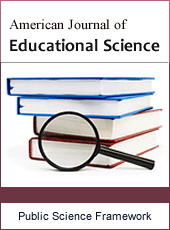American Journal of Educational Science
Articles Information
American Journal of Educational Science, Vol.4, No.4, Dec. 2018, Pub. Date: Oct. 9, 2018
Two Innovative Teaching Strategies and Academic Performance of Senior Secondary School Students in Biology: Ekiti State Experience
Pages: 127-135 Views: 2257 Downloads: 1624
[01]
Ariyo Beatrice Oluwatoyin, Department of Science Education, Faculty of Education, Ekiti State University, Ado Ekiti, Nigeria.
[02]
Monogbe Tunde Gabriel, Department of Finance and Banking, Faculty of Management Sciences, University of Port Harcourt, Choba, Nigeria.
This study investigated the effects of two innovative teaching strategies i.e. Kolawole’s Problem Solving and the use of Lab-less Kit strategies on the academic performance of secondary school students in Biology in Ekiti-State. It also examined the interactive effects of gender and location on performance of students exposed to two strategies. The study adopted quasi–experimental pre-test/post-test research design. Two hundred and nine students were selected for the study. Kolawole’s Problem Solving strategy and Lab-less kits were used as treatment. The instrument used for the study was Biology Achievement Test, Analysis of Variance, Analysis of Covariance and Post Hoc analysis were used to analyse data collected. The study revealed that there were significant difference between the mean pre-test and post-test score of the experimental groups and control group in which the experimental groups performed better; it also indicated no gender and location influence in the use of Kolawole’s Problem Solving strategy and lab-less and students’ performance. Based on the findings of the study, it is recommended among others that Government should provide Lab-less Kits to secondary schools in the State. Also, Biology teachers should be given adequate orientation through workshops and seminars to update their knowledge in the use of Kolawole’s Problem Solving strategy and Lab-less Kit strategies in teaching.
Kolawole Problem Solving Technique, Lab-Less Kits, Conventional Laboratory Technique
[01]
The West African Examinations council (2010) Biology Chief Examiners, Reports. Lagos: Megavons (w.a) LTD, May/June
[02]
The West African Examinations council (2011) Biology Chief Examiners, Reports. Lagos: Megavons (w.a) LTD, May/June.
[03]
The West African Examinations council (2012) Biology Chief Examiners, Reports. Lagos: Megavons (w.a) LTD, November/December.
[04]
Ureme, S. (2010). Cheating in NECO examination. Daily Sun, Wednesday, 29th September, 2010 pp 18.
[05]
Okafor, P. (2007). Laboratory Resources and Utilization as Correlates of Biology Students’ Learning Outcomes. 41st STAN Annual Conference Proceedings, 169-173.
[06]
Nwosu, E. C. (2000). Resource Utilization in Science Education (Biology) Class-rooms: Implications for the Researcher). 41st Annual STAN Conference Proceedings, 166-167.
[07]
Ottander, C. & Grelsson, G., (2006). Laboratory work: the teachers’ perspective. Journal of Biological Education, 40 (3), 113-118.
[08]
Kolawole, E. B. (2012). Kolawole’s Problem-Solving Method (KPS) A panacea to mathematical and life’s problems. Standard Journal of Education and Essay, 1 (8), 131-141.
[09]
Njoku, Z. C. (2002). Enhancing girls’ acquisition of science process skills in co- educational schools. An experience with six group for practical Biology. Journal of Science Teachers Association of Nigeria, 37, (1 and 2).
[10]
Njoku, Z. C. (2007). Comparison of students’ Achievement in three categories of Questions in SSCE Practical Biology Examination. Journal of Science Teachers Association of Nigeria, 42. (1 and 2), 67-72.
[11]
Adesoji, O. A (2006). Status of Human and Material Resources for Nigerian Science and Technical Colleges: Issues and challenges for STM Education. 47th STAN conference proceedings, 8-13.
[12]
Akusoba, F. U., & Okafor, C. O. (2004). Biology Students Performance and knowledge Retention. Orient Journal of Educational Research, 1 (1), 1-10.
[13]
Eule, F. O., & Chukwu, A. C. (2005). Enriching the teaching of Biology in the Secondary School: Provision and Effective utilization of Resources. 41st STAN Annual Conference Proceedings, 183-185.
[14]
Asiyai R. F (2006). An appraisal of the adequacy of the physical resources available for teaching Biology in secondary schools in Delta State. 47th STAN conference Proceedings, 196-200.
[15]
Kolawole, E. B. (2013). Gender issues and academic performance of senior secondary school students in Mathematics computation tasks in Ekiti State Nigeria. Pakistan Journal of Social Sciences, 15 (1), 102-111.
[16]
Ajayi, M. T. (2015). Effect of labless science equipment, improvised science equipment and Conventional laboratory on academic performance of Secondary School students in Biology in Osun State. Unpublished Ph.D thesis, Ekiti State University, Ado – Ekiti, Ekiti State Nigeria.
[17]
Seweje, R. O. (2010). Science Education and Science Teaching Methods. Ado – Ekiti, Greenland Publishers.
[18]
Kolawole, E. B. & Ajetunmobi, O., (2014). KPS Method: A sustainable, development and human capacity building tool in teaching, learning and evaluation in the third world nations. Journal of Emerging Trends in Educational Research and Policy Studies 5 (57) 42-47.
[19]
Williams, J. H. (2005). Cross-national variations in rural Biology achievement: A descriptive overview. Journal of Research in Rural Education, 20, 1-18. Retrieved from www.umaine.edu/jrr.htm

ISSN Print: 2381-7127
ISSN Online: 2381-7135
Current Issue:
Vol. 6, Issue 2, June Submit a Manuscript Join Editorial Board Join Reviewer Team
ISSN Online: 2381-7135
Current Issue:
Vol. 6, Issue 2, June Submit a Manuscript Join Editorial Board Join Reviewer Team
| About This Journal |
| All Issues |
| Open Access |
| Indexing |
| Payment Information |
| Author Guidelines |
| Review Process |
| Publication Ethics |
| Editorial Board |
| Peer Reviewers |


